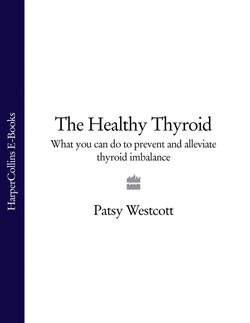Читать книгу The Healthy Thyroid: What you can do to prevent and alleviate thyroid imbalance - Patsy Westcott - Страница 39
CHAPTER THREE The Out-of-Balance Thyroid
ОглавлениеGiven the wide-ranging action of the thyroid, it is hardly surprising that, when something goes wrong, it affects the entire body. Exactly what these effects are depends on whether your thyroid becomes underactive or overactive.
Hypothyroidism, or the underactive thyroid, can produce a long and bewildering list of symptoms (see Table 3.4, page 42). Most of these are non-specific and easily attributable to some other disorder or simply fatigue – one reason why it often takes so long to get a diagnosis. As Camille recalls:
I noticed that my mental energy had gone right down, but I kept rationalizing. The tiredness was dreadful, but I persuaded myself it was because I was overdoing it. I kept saying to myself, ‘If only I’d taken two weeks off at Christmas, I wouldn’t be feeling so tired’. It was only the hair loss that got me in for a test.
Clare has a similar story:
I just thought I was putting on weight. I put on two-and-a-half stone in as many years. Yet, despite going to Weight Watchers and not cheating, I couldn’t shift it. In retrospect, there were other clues. I developed coarse skin but, because I’d had a baby, and my hands were in and out of sterilizing solution, I just thought it was that. My periods were irregular and I was tired all the time, but I put that down to working and having a family. It was sheer vanity that drove me to the surgery in the end.
Jennifer, who developed an underactive thyroid after the birth of her second child, remembers:
My energy levels fluctuated from day to day. I would start the week feeling fine but, by Tuesday, I would be completely exhausted and have to take the day off. I managed to drag myself through Wednesday and Thursday, and Friday I had off. I would spend the weekend in bed. I was so depressed, I would sometimes just lie there and cry. I had constant headaches and sore throats, my muscles ached, my nails were brittle, and I was always getting flu. I couldn’t concentrate; my memory was appalling. I was so cold that, even in the summer, I had to take a hot-water bottle to bed. Our sex life went completely downhill.
The key characteristic of hypothyroidism is that all your systems slow down as a result of metabolism running on near-empty. Your appetite decreases and what you do eat is converted into energy more slowly. You gain weight and feel permanently cold. The smallest task becomes a supreme effort. Your muscles feel weak and stiff, and ache on the slightest exertion. Just walking up the road can leave you exhausted and breathless. You may experience muscle cramps. Your heart beats more slowly and your pulse is slowed while blood pressure rises. Digestion takes longer and you become constipated. You may also experience joint pain and stiffness. Your kidneys work more slowly, leading to water retention and tissue swelling (oedema). Your liver also slows down, resulting in a rise in levels of ‘bad’ LDL cholesterol and other blood fats known as triglycerides. You may succumb to every passing minor infection as the lack of thyroid hormones takes its toll on your immune system. Cuts and bruises take a long time to heal because of the fragility of your blood vessels. You feel miserable, washed out and overwhelmed with fatigue. As Christine observes, ‘It is total; every body system is affected. People often say, “I just feel so ill, but I can’t put my finger on it.”’
